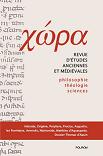Catharsis et plaisir tragique selon Aristote
Catharsis et plaisir tragique selon Aristote
Author(s): William MarxSubject(s): History of Philosophy, Ancient Philosphy
Published by: EDITURA POLIROM S.A.
Keywords: Catharsis; Aristotle; cognitive pleasure; aesthetic pleasure; “specific” pleasure of tragedy;
Summary/Abstract: Catharsis and tragic pleasure according to Aristotle. According to Aristotle, tragedies induce three different kinds of pleasures. First, there is the cognitive pleasure of imitation, since it is pleasurable to recognize in the imitation an object one already knows. Second, there is the aesthetic pleasure linked to the material parameters of the tragedy, that is the language, the show, and the performance (verses, singing, acting). Third, there is the “specific” pleasure of tragedy. This specific pleasure is linked to the affects of pity and fear through the process of catharsis. Although pity and fear are two opposite affects depending on the position of the subject relatively to an event, the spectator of the tragedy is bound to experience both of them simultaneously because of the ethical similarity the playwright must keep between him and the tragic hero. But pity and fear are also two opposite affects on the physiological level: pity is a warm affect, fear a cold one. Catharsis is then a physiological balancing of pity by fear, of warmth by cold, and reciprocally, and this continuous suppression of excesses of temperature through the tragic imitation, while bringing a feeling of relief and pleasure, rids the spectator of all excessive affects. Catharsis provides a healthy and hygienic pleasure, and so can Aristotle effectively reply to Plato’s criticism of tragedy
Journal: Chôra. Revue d'études anciennes et médiévales
- Issue Year: 2019
- Issue No: 17
- Page Range: 163-180
- Page Count: 18
- Language: French
- Content File-PDF

